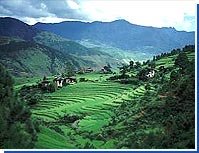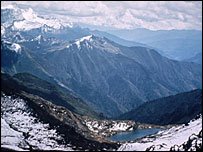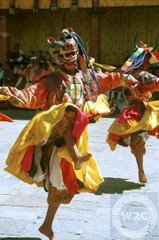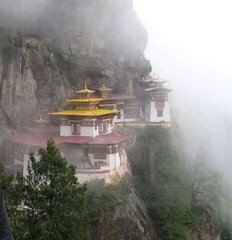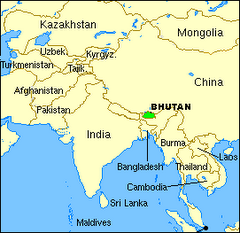-On August 8,1949, Bhutan gained its independence from India
-When the Chinese People's Liberation Army entered Tibet in 1951, Bhutan closed its border on the north and improved its relations with India. It also began a program to modernize, which was funded largely by India.
-In 1953, the country's legislature, the National Assembly, was established to create a more democratic form of government in Bhutan
-In 1971. Bhutan joined the United Nations
-Bhutan is currently an absolute monarchy, but is expected to become a constitutional monarchy by 2008
-In 1998, King Jigme Singye Wangchuck made reforms in the government and transferred most of his powers to the Prime Minister
-In 1999, the prohibition on television and the Internet was lifted, in an attempt to increase Bhutan's Gross National Happiness
-In December 2006 the King of Bhutan abdicated the throne, and his son, Jigme Khesar Namgyel Wangchuck became the new king
-Bhutan currently has no constitution. However, a draft constitution was created in 2005 and is expected to be adopted by the government in 2008
-The legal system of Bhutan is based on Indian and English laws
Thursday, May 17, 2007
Monday, April 2, 2007
Bhutan Facts
 -The official language of Bhutan is Dzongkha.
-The official language of Bhutan is Dzongkha.-Buddhism is the state religion
-Bhutan has been a monarchy since 1907, and the current king is King Jigme Khesar Namgyal Wangchuck.
-Bhutan's national sport is archery, and competitions are held regularly in most villages.

-Bhutan is one of the most isolated nations in the world;
until recently, the government regulated tourism and foreign influences in the country to preserve its traditional Tibetan Buddhist culture. Consequently, Bhutan is often described as the last surviving place where traditional Himalayan Buddhist culture still remains. Now, a high tourist tariff and the requirement for visitors to go on packaged tours limits the amount of tourism in the country.
-Interesting fact: Bhutan is the only country in the world to have banned tobacco smoking and the sale of tobacco.
-The population of Bhutan was at one time estimated to be several million. However, the government began to regulate the population size of the country during the early nineties, and and it is now only about 750,ooo.
-Bhutan has no formal relations with the United States
-Literacy Rate: 47% (Males: 60%, Females: 34%)
Subscribe to:
Posts (Atom)
Paro Tsechu
Paro Tsechu is a religious festival held in Bhutan.
